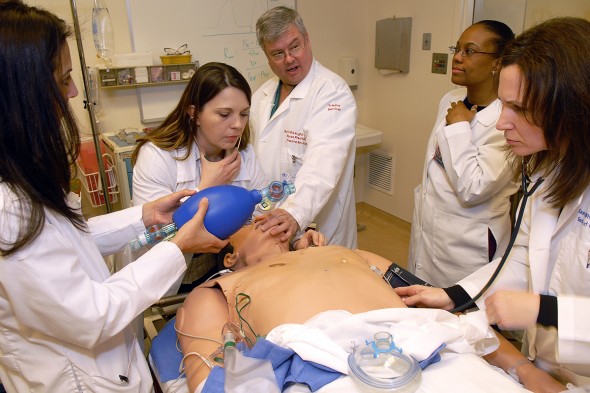Using technology to train health care professionals

UIC College of Nursing clinical instructor Richard McLaughlin shows students at the Rockford regional program how to properly intubate a mannequin.
Technology and teamwork are playing an ever-increasing role in health care education.
The University of Illinois at Chicago College of Nursing has received a three-year federal grant from the Health Resources and Services Administration to expand its interprofessional education curriculum.
The grant, valued at nearly $1 million, will allow UIC to use technology that will provide students with clinical care experience in its advanced nurse practitioner program.
Numerous studies have shown that patients are provided better care when two or more health professions work together, said Jean Berry, clinical associate professor of biobehavioral studies and lead researcher on the grant. UIC offers a unique opportunity as it “remains one of the few academic health science centers in the world housing almost every health science profession,” she said.
“This grant will improve our programs by maximizing the strengths and skills of each provider in working towards streamlining and optimizing patient care.”
Interprofessional clinical education is currently being employed within the UIC medical community, Berry said. The roles of nurse practitioners and physicians have been examined to discover how efficient health care is delivered when different professionals work together.
In a new, yet-to-be-published UIC study conducted by Susan Corbridge, clinical assistant professor of biobehavioral sciences who is assisting Berry on the new grant, physicians in the interprofessional group believe nurses were more skilled with patient communication techniques and are better at providing culturally sensitive care.
Physicians felt working more closely with nurses enhanced overall patient care, Corbridge said.
Technology such as patient simulation and standardized patients — both of which have shown to improve patient safety and quality of health care delivery — will be used in the new program, Berry said. These experiences are currently lacking in primary-care areas, where complex chronic disease management impacts recovery and survival, she said.
Undergraduate nursing students at UIC currently use computer programs and low-fidelity mannequin models to simulate clinical scenarios and practice basic skills, such as drawing blood. Graduate students use high-fidelity simulators that are a combination of sophisticated mannequins with high-tech computer programs that closely mimic real clinical scenarios.
Students will also be provided with real-case scenarios through video demonstrations, as well as electronically based case studies, where students learn valuable decision-making skills. Telemedicine — the exchange of medical information from one site to another via electronic communications — will also be used.
The new initiative will be incorporated into the curriculum at the UIC College of Nursing and its four regional campuses: Urbana, Rockford, Peoria and the Quad Cities. It will also be offered to other health professional programs at UIC, including the Urban Medicine Program.
Students will develop a team-based learning environment to assist the underserved population in Chicago — or rural populations in the regional campuses — who experience the greatest health disparities and burdens of chronic, non-communicable diseases, such as diabetes, asthma, cardiovascular disorders and obesity, Berry said.
Underserved minorities are projected to constitute 40 percent of the U.S. population by 2035, she said. There is a “tremendous need for healthcare providers prepared via interprofessional education and technology to prevent and manage non-communicable diseases, and advanced practice nurses are well positioned to provide this expertise.”
UIC ranks among the nation’s leading research universities and is Chicago’s largest university with 27,500 students, 12,000 faculty and staff, 15 colleges and the state’s major public medical center. A hallmark of the campus is the Great Cities Commitment, through which UIC faculty, students and staff engage with community, corporate, foundation and government partners in hundreds of programs to improve the quality of life in metropolitan areas around the world.
